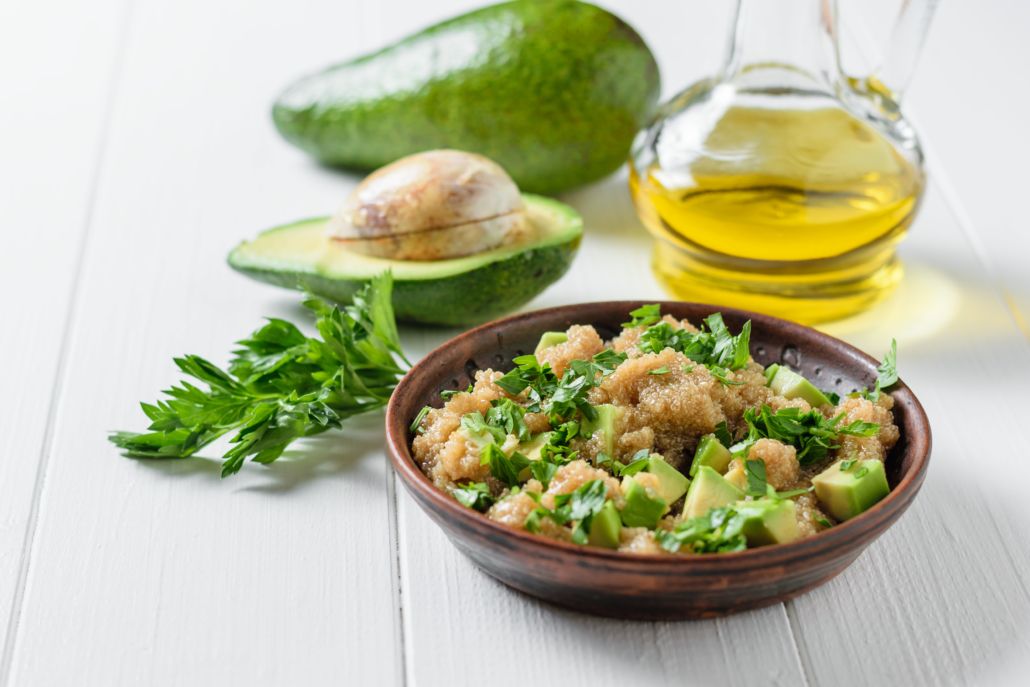Avocados have become an indispensable addition to our diets in the last few years. But many people still wonder whether it’s fruit or fat. It has an extremely high-fat content but isn’t sweet like many fruits.
Avocado is a fruit that has a dark green outer shell, a light green interior, and a large seed in the middle. It has a rich, creamy flavor that ranges from slightly sweet to mildly earthy, depending on the type. They originated in Mexico before being cultivated in Central and South America. Avocados are now grown in tropical and Mediterranean climates around the world and are recognized for their nutritional value. So what are the benefits of avocados?

Lots of Vitamins and Minerals
Avocados are loaded with nutrients. They contain at least 20 different vitamins and minerals as well as omega-3 fatty acids. Just 100 grams of avocado meets a significant amount of the daily recommended intake of the following nutrients:
- Vitamin K: 26%
- Folic Acid: 20%
- Vitamin C: 17%
- Vitamin B5: 14%
- Potassium: 14%
- Vitamin B6: 13%
- Vitamin E: 10%
Avocados also contain magnesium, manganese, copper, iron, zinc, phosphorus, and vitamin A, B1 (thiamine), B2 (riboflavin) and B3 (niacin).
High in Potassium
Potassium is crucial for our bodies Unfortunately, many people do not get enough of it from their daily diets. That’s where avocados can help.. A 100-gram serving meets 14 percent of your daily potassium requirement. Getting enough of this vital nutrient lowers blood pressure, reducing the risk of heart attack, stroke, and kidney disease. Being high in potassium is an important benefit of avocados.
Contain Monounsaturated Fatty Acids
Avocados have a high-fat content, but that’s no reason to avoid them. The fats they contain are oleic fatty acids, which are also found in olive oil. Oleic fatty acids are monounsaturated and are beneficial for health. They reduce inflammation and help protect against some cancers.

High in Fiber
Another benefit of avocados is that they are rich in fiber. Fiber can assist with weight loss, regulate blood sugar, support bowel movements, and increase the number of beneficial bacteria in the gut. Each 100-gram serving contains seven grams of fiber, which constitutes 27 percent of the recommended daily fiber consumption.
Reduce Cholesterol and Triglyceride Levels
Heart disease is one of the most common causes of death in the world. Avocados can be beneficial when it comes to this issue. They help to lower the level of bad cholesterol in the blood while increasing good cholesterol. Studies show that they can reduce triglycerides by up to 20 percent and LDL (bad) cholesterol by up to 22 percent while raising the HDL (good) cholesterol level by up to 11 percent.
Increase Nutrient Absorption
Eating nutritious food isn't enough to get the nutrients into the body. Nutrients need help so they can be absorbed. Some foods are absorbed by dissolving in the water while others are oil soluble. The high-fat content found in avocados can facilitate the absorption of fat-soluble vitamins such as vitamins A, D, E, and K and allow the body to use them efficiently.

Protect Eye Health
In addition to aiding in the absorption of fat-soluble vitamins, avocados simplify the absorption of antioxidants such as zeaxanthin and carotenoids, which are carried by these vitamins.
These antioxidant components are beneficial for eye health.
Help to Lose Weight
If you're having trouble losing weight, adding avocados in your diet may help. Studies show that people who include avocados in their daily diet stay satiated 23 percent longer than those who don’t. Although we tend to avoid consuming fats while trying to lose weight, they actually may help due to their long digestion time. This helps you feel fuller for longer. The fiber in avocados may also aid in weight loss as it regulates digestion.
Avocado is a fruit that is both delicious and beneficial for health. So how can you add avocado to your daily diet?

You can add slices or use it in a dressing for your salads. The vitamins and minerals will add nutrients and the fat will extend your satiety time. Here is a simple dressing recipe to help you get started.
- ½ avocado
- 1 teaspoon olive oil
- 1 tablespoon lemon juice
- 1/4 clove of garlic
- pinch of dill
Mix all ingredients in a bowl or blend in a food processor until smooth. Drizzle over salad and enjoy!
Avocados also make great snacks. Slice an avocado, then top with a little salt and pepper to help tide you over. Mash it into a paste, spread on toast, and add an egg on top for a quick and yummy breakfast. Avocados can even be made into a great cocoa pudding by adding in some cocoa, honey, walnuts, and a little herbal milk - a delicious and nutritious dessert.
No single food is a “magic bullet”, but avocados come pretty close. Adding them to a balanced diet will help you take advantage of their many benefits of avocados.















